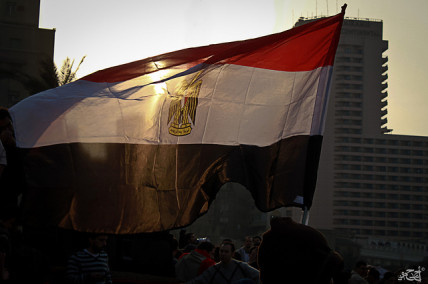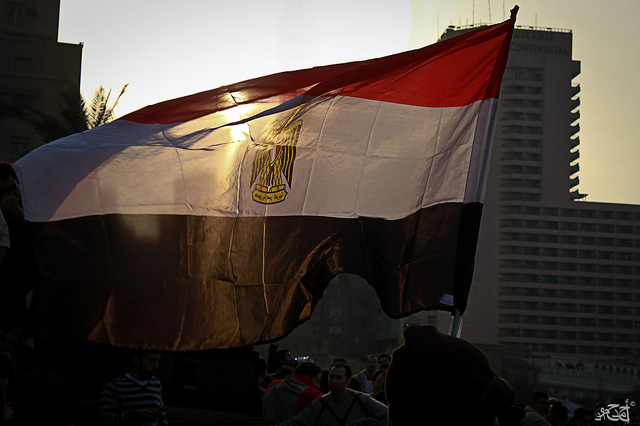
Photograph by Ahmad Hammoud
Violence in Egypt will only be reigned in when it is no longer useful for the security services’ twin purposes of discrediting the Muslim Brotherhood and discouraging popular mobilization aimed at making government responsive to the needs of its citizens.
Violence in Egypt reached a new peak after Muhammad Morsi’s ouster. The conflict has pitted the ‘security state’ and its allies against the Muslim Brotherhood and its supporters, but with the Brotherhood’s ‘revolutionary credentials’ long squandered, it is facing the full might of the ‘deep state’. This at least temporarily coherent front of armed forces, internal security, former regime members (felool), and commercial elites not aligned with the Brotherhood – particularly in the media – have attacked the Brotherhood relentlessly, both physically with a gruesome display of violence and in the media.
There have been calls for western governments to try to stop this violence, and on the Egyptian security forces to restrain themselves, but these calls fail to recognise just how useful the violence is to Egypt’s newly assertive regime.
The Muslim Brotherhood’s Failure
There is little doubt that the Brotherhood’s tactics in power were foolhardy. Its only serious chance of countering the economic, media and security power of Egypt’s ‘deep state’ was through popular mobilisation, coalition-building, and economic reform – yet this was an unlikely avenue for a movement used to compromising with power and to charity to paper over the worst effects of economic ‘reform’.
Very early on after Mubarak’s removal, it was clear that the Brotherhood was unwilling to build a broad coalition against the ‘deep state’ to further the demands made during the January 2011 uprising. Rather, it preferred to combine trying to place its men in key positions of the state and security apparatus with striking a deal with the military and the internal security forces – or at least the attempt to do so, just as it had always attempted with the Mubarak regime.
Indeed, although in opposition under Mubarak, the Brotherhood was comfortable in the ‘system’ the Egyptian state controls and oversees: it never attempted to formulate a genuine political or economic alternative to this regime beyond visibly empty slogans such as ‘Islam is the solution’, regardless of how central social justice and economic rights were to the January 25th Uprising.
The Regime Reincarnate
Not least as a result of the Muslim Brotherhood’s attempt to take control of the levers of state in the name of democracy and of the revolution, the interests of the various components of Egypt’s ‘deep state’ converged on two objectives. First, in neutralising the threat from the Brotherhood itself gaining the kind of leverage the Justice and Development Party gained in Turkey. This fight was never going to be on equal terms: although the Brotherhood remains Egypt’s largest and best-organised political force, its resources pale in comparison to the state’s. Second, and more importantly, the components of the ‘deep state’ share an interest in neutralising the very idea that it might be possible for Egypt’s dissatisfied population to mobilise to demand a representative government willing and able to address the people’s needs. This possibility was the truly revolutionary aspect of the uprising on January 25th, 2011.
The Function of Violence
Since Morsi’s removal on July 3, the Brotherhood’s leadership, its rank and file, and its sympathisers have been given no quarter by the army and internal security forces, with several gruesome episodes of violence against pro-Morsi demonstrators across the country, and in Cairo in particular. The death toll has been horrific, climbing into the high hundreds, overwhelming Cairo’s only morgue, and offering a gruesome illustration of both the ‘deep state’s’ determination and its current sense of impregnability. Both the EU and the USA attempted to broker a peaceful resolution to the clash between the Brotherhood and the security forces, but most accounts agree it was the latter that ultimately refused to compromise.
There has been much brow-beating about this refusal and about what western governments could do – such as to cut aid to the military – but there has been little acknowledgement that as things stand the military, internal security forces, and the ‘deep state’ generally have no incentive to compromise. Prime Minister Hazem Beblawi has implied as much, rebuffing suggestions by EU and US politicians that aid packages might be revised.
But more than that, the repressive wave aimed at the Brotherhood is useful to the ‘deep state’.
The violence – attacks on Coptic churches, on the police, and particularly the Brotherhood’s reactions to security forces – play straight into the narrative that the deep state is easily controlling: with Islamist media closed or censored, with control of state media, and the support of ‘liberal’ media, the current government can present events as a “war on terrorism”, as a defence of Egypt against radical Islamists, even as a defence of revolutionary values.
The harsher the response from more radical Islamists, the greater validation the ‘deep state’ can claim for its actions. The first function of the violence is therefore to radicalise, polarise, and through media control of the narrative, further isolate the Brotherhood. So sure is the regime that it can easily achieve this isolation, that the interim government has felt confident in openly discussing plans for disbanding the Brotherhood, declaring it an illegal organization.
The second and more general effect of the violence and the framing of the Brotherhood’s time in power is to re-establish in the minds of ordinary Egyptians the belief in, and fear of, the all-powerful ‘deep state’. While currently its most high-profile targets have been the Brotherhood’s supporters, during the military junta’s time in power and since then, the regime has unceremoniously targeted any and all opposition, especially the array of liberal, leftist, secular groups and progressive Islamists, not to mention the independent trade unions, which spearheaded the January Uprising in the first place.
After its preferred tactics of elite negotiations failed, the Brotherhood attempted to resist the deep state’s onslaught through mass mobilization. After the apparent triumph of mass demonstrations against the regime in 2011, it is in the interest of the regime’s new incarnation to drive home just how powerful it is, and just how futile such mass demonstrations are against its full might.
If example is now being made of the Brotherhood, the ultimate target of current violence is any Egyptian who might hope for a truly representative government acting not in the name of special interests, but of the public good. But with news of Hosni Mubarak’s imminent release from prison, one has to wonder whether the generals have already begun to overplay their hand. Again.
Written by Andrea Teti
Andrea Teti is Director of the Centre for Global Security and Governance at the University of Aberdeen and Senior Fellow at the Brussels-based European Centre for International Affairs. Follow him on Twitter@a_teti.




